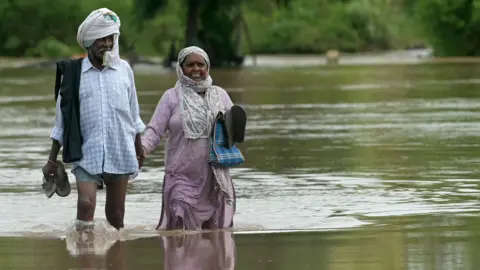At least 30 individuals have lost their lives in Beijing due to severe flooding, with over 80,000 people evacuated, as reported by Chinese officials. The catastrophic weather has also resulted in eight deaths from a landslide in the nearby city of Chengde. This summer has seen China face a surge in extreme weather events, which began with intense heatwaves in the eastern region followed by flooding in the southwest.
In the wake of these floods, President Xi Jinping emphasized the need for "all-out" rescue operations in a bid to prepare for the "worst-case and extreme scenarios." He has urged local governments to spare no effort in locating and rescuing trapped individuals, relocating residents from affected zones, and minimizing potential fatalities. The government has allocated 200 million yuan (approximately $28 million) for disaster recovery, focusing on restoring transportation and infrastructure.
Suburban districts such as Miyun and Huairou were particularly hard hit, with extensive damages to roads rendering many impassable and cutting off power to over 130 villages. Eyewitness accounts describe the flooding as a sudden and overwhelming disaster, with videos emerging of first responders navigating chest-deep waters to rescue stranded citizens and utilizing helicopters and drones for aid delivery.
Residents are expressing deep concern for their families and homes. Ms. Yang, concerned for her relatives in the severely impacted Miyun district, revealed her desperation to receive information, as she has been unable to contact them since the onset of the floods. Meanwhile, shop-owner Zhuang Zhelin recounted the chaotic moments as the water levels surged rapidly.
Beijing has a history of flooding, especially during summertime, highlighted by a deadly incident in July 2012 that resulted in 79 fatalities from a single day of torrential rain. However, the recent uptick in extreme weather events across China raises alarm about the potential long-term impacts of climate change on the nation’s infrastructure and agriculture, which has already sustained significant economic losses. The emergency management ministry reported that natural disasters in 2023 have already cost China around 54.11 billion yuan ($7.5 billion), with flooding accounting for the majority of the damages.





















